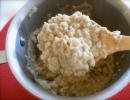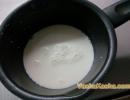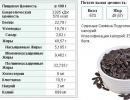Horseradish: the benefits and harms of the root and leaves for the body
Liked? =>
Horseradish, this primordially Russian seasoning for a large number of traditional dishes, is not in vain very popular in cooking and medicine.
The benefits of horseradish for the body are very high. Due to the large number of aromatic substances, essential oils, bitterness and vitamins, it affects almost all organs and systems of the body.
And in order not to get confused, the medicinal properties of horseradish need to be classified somehow.
What is useful horseradish for the body
1. For digestion.
The root very strongly activates the work of the intestines and the secretion of various. It owes such a medicinal effect to mineral salts, mustard oil and a special substance - sinigrin. The latter, by the way, gives it a specific spicy taste.
Together, these components that make up horseradish greatly stimulate appetite and act on the receptors of the digestive system, stimulating the production of gastric juice. But everything is good in moderation.
And horseradish in very large quantities can be harmful to the digestive tract. It can increase the acidity of the stomach and aggravate the manifestations of gastritis and peptic ulcer. Therefore, it should be used only as a spice.
2. For joints.
In folk medicine, there are a large number of recipes for the use of horseradish for the treatment of many inflammatory diseases and diseases associated with salt imbalance in the joints.

For example, horseradish tincture is actively used to relieve external inflammation and in the treatment of gout, to warm up stretched muscles and to accelerate wound healing. In addition, horseradish is known to be useful for rheumatism. Regular use of the root crop helps relieve pain and partial regeneration of cartilage tissue.
3. For the liver and kidneys.
But, perhaps, horseradish can be even more effective for the kidneys and liver. The choleretic and diuretic properties of horseradish are to blame for this. At the same time, it has almost no contraindications for diseases of these liver and kidneys.
4. For immunity.
But horseradish is especially rich in beneficial substances that strengthen the immune system and have obvious bactericidal properties. You can start the list of healing components with typical vitamin C and carotene, which are necessary to support the body's defenses in any season. This is especially true for vitamin C, the immune-activating function of which is its main goal in the body.
It contains a rather complex substance lysozyme, which has pronounced bactericidal properties. It is a kind of natural antibiotic that kills harmful microbes in the body. Phytoncides and mustard oils have similar beneficial properties. Due to the large number of them in horseradish, it can also be used as a filler for antiseptic dressings. And horseradish juice is an excellent disinfectant for lubricating open wounds.
5. For breathing.
Many daredevils know the effect of inhaling the vapors of ground horseradish. Strong irritation of very sensitive receptors of the upper respiratory tract is the result of the action of many phytoncides. And this action is not only annoying. In viral and microbial diseases, phytoncides contribute to the destruction of pathogenic microorganisms. And the use of essential oils, which are also part of the tart vegetable, is that they produce a strong expectorant effect. These medicinal properties of horseradish have found their application in the treatment of acute respiratory diseases.
There are many more healing properties of horseradish for men and women. So, its positive effect on potency has been noticed. Yes, and with anemia, it can be very useful. Therefore, in the absence of diseases of the gastrointestinal tract, it is worth using medicinal horseradish more often. Especially - in winter and spring, in the most difficult periods for the body.





